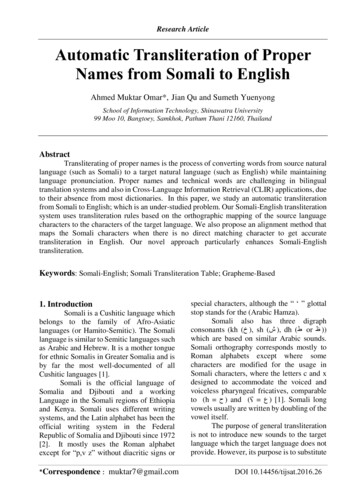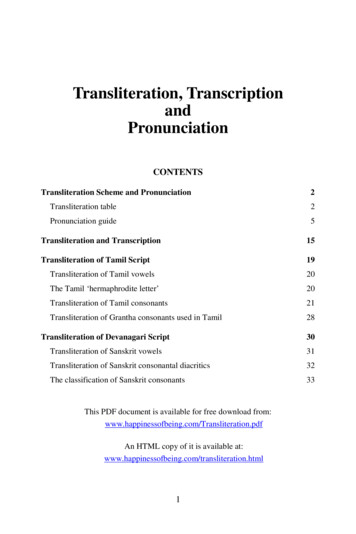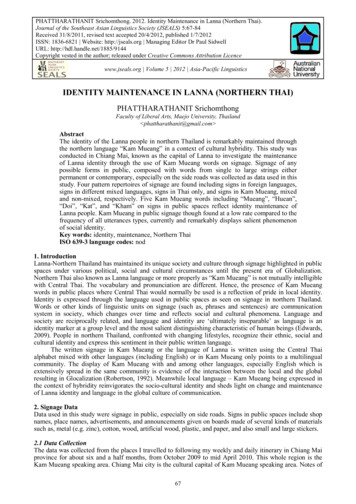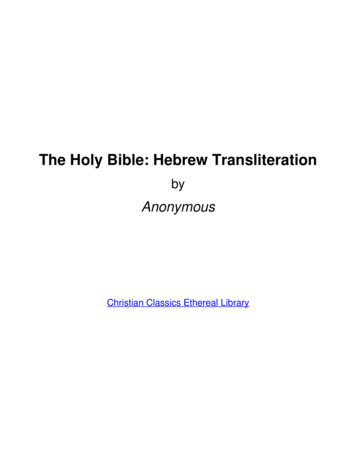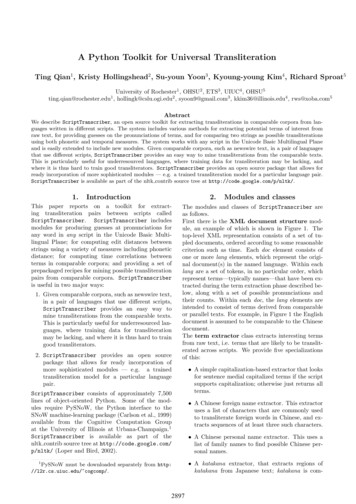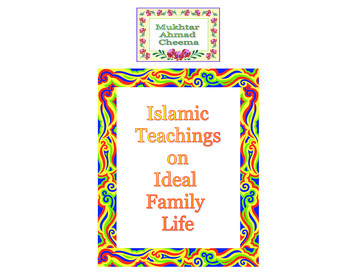
Transcription
Note on TransliterationIn this work, the transliteration of the Arabic words andexpressions has been conformed to the Royal Asiatic Societystandards as follows.The Y is represented by ’ , a sortof catch in the voice, and by thea‘rāb, if applicable, as indicatedbelow.The Z is represented by a or thea‘rāb, as indicated below.The [ is represented by b.The \ is represented by t.The ] is represented by th,pronounced like th in the Englishword thing.The is represented by by j.The a is represented by .The b is represented by khpronounced like the Scottish ch inloch.The d is represented by d.The e is represented by dhpronounced like the th in theEnglish words that and with.The f is represented by r.The g is represented by z.The i is represented by s.The j is represented by sh.The k is represented by ”.The l is represented by ñpronounced like the th in theEnglish word this.The m is represented by ’.The n is represented by Â.The o is represented by ‘ , astrong gluttoral specific to Arabic.Th p is represented by gh, asound approached very nearly in ther grasseye in French.The q is represented by f.The r is represented by q.The t is represented by k.The v is represented by l.The w is represented by m.The x is represented by n.The y is represented by h.The z is represented by v or w.The } is represented by y.The fat a is represented by an a (pronounced like the u in the Englishword bud) when short, and by å (pronounced like the a in the English wordfather) when long, by ai (pronounced like the ay in the English word say)when followed by a ya, and by au (pronounced resembling the ou in theEnglish word sound) when followed by a waw.The kasrah is represented by an i (pronounced like the i in the Englishword bid) when short, by (pronounced like the ee in the English word deep)when long.The ñamma is represented by a u (pronounced like the oo in the Englishword wood) when short, by · (pronounced like the oo in the English wordshoot) when long.
In the name of Allāh, the Gracious, the MercifulISLĀMIC TEACHINGSONIDEAL FAMILY LIFEPublished ByAḥmadiyya Movement in Islām15000 Good Hope RoadSilver Spring MD 20905
First Edition: August 2008.The A madiyya Movement in Islām, U.S.A.15000 Good Hope Road, Silver Spring, MD 20905ISBN 1-882494-56-3Copyright 2008 Islām International Publications Ltd.Islāmābād, Sheephatch Lane, Tilford, Surrey GU10 2AQUnited Kingdom.No part of this publication may be reproduced, stored in retrievalsystem or transmitted in any form or by any means, electronic,mechanical, photocopying, recording, or otherwise, without priorwritten permission from the Publisher, except for the quotation ofbrief passages in criticism.
ContentsForeword 3Islāmic Teachings on Pre-Marital Counseling 5Islāmic Marriage System 6What is Marriage? 6No Room for Celibacy in Islām 7Status of Men and Women 8Purpose of Marriage 14Propagation of Species through Marriage 15Selection of a Partner 17Compatibility (Kufw)Piety Must be a PriorityTruthfulness in Exchanging InformationRole of Parents in the MarriageSeeing of Each Other For Marriage1718191920Essentials of Marriage (Nikāḥ) 21Dowry (Mahr)Limit of Dowry (Mahr)Guardian (Walī)Consent of Bride for MarriageGuardian of a Muslim Girl of a Non-Muslim FamilyThe Need for a Guardian for a WomanAnnouncement of Marriage (Nikāḥ Ceremony)No Nikāḥ Without a Guardian for the BrideTwo Witnesses are a Must for Nikāḥ212323232424252626Aḥmadiyya Muslim Community USA Guidelines forWedding Ceremonies 27Islāmic Teachings on Post-Marital Councelingfor Ideal Family Life 29Responsibilities of Husband and Wife as LifePartners 30Supplications to God for a Happy LifeMen as Guardians of WomenNoble example of the Wives of the Holy ProphetLadies First31323636
Exemplary Family 37Simple Farewell Ceremony for the Daughter of ḤaḍratMirzā Ghulām Aḥmad, the Promised Messiah, peace be onhim 38Obligations of a Married Couple to Parents and Children 39The Future Generation 44Islāmic Veil 49Wisdom Behind the Injunctions of Veil 50Requirements of the Islāmic System of Veil 51Extreme Attitudes about Veil 52Glossary 54Index 56 2
ForewordBeing a complete and final religion from God, Islāmguides all aspects of our lives. This guidance is contained inthe Holy Qur’ān; the life-time examples (that is, the Sunnah)and the sayings (Ḥadīth) of the Holy Prophet Muḥammad(peace and blessings of Allāh be on him).In the USA, our members grow up in a non-Islāmicculture, and there are also converts to Islām who need tolearn the Islāmic guidelines on marriage (just as in othermatters). In light of this, Jamā‘at Aḥmadiyya in USA hascolleted the relevant teachings on marriage.These contain the Qur’ānic injunctions, extracts from theSunnah of the Holy Prophet Muḥammad, peace andblessings of Allāh be on him, his example and writtenmaterial obtained from the writings of Ḥaḍrat Mirzā GhulāmAḥmad, the Promised Messiah, peace be on him.This task was performed by the Tarbiyat Committeeincluding members of the auxiliary organizations. Althoughthe brunt of this work was borne by Maulānā MukhtārAḥmad Cheema, Maulānā Dāūd Ḥanīf made finaladjustments.The compilation of the material is divided as follows: Part One is on Islāmic teachings when viewed as apremarital advice (counseling before Nikāḥ). Part Two is advice on conduct during married life. Part Three is on solutions to problems if and whenthey arise in the course of married life, so as to restoredomestic peace and harmony. This will be printedseparately. 3
This treatise is presented in the hope that many of thequestions will be answered and that it will form the basis formutual discussion among the parties. In particular it mayhelp in defining expectations for married life as an AḥmadīMuslim. In Shā’ Allāh.Wassalām,Ahsānullāh ẒafarAmīr, Aḥmadiyya Movement in Islām, U S A 4
Islāmic TeachingsonPre-Marital Counseling 5
Islāmic Marriage SystemAlmighty Allāh has created everything in pairs. It is ascientific fact that these pairs exist in all things, in vegetablekingdom, even in inorganic matters. There is not any iota ofdoubt that these elements don’t exist by themselves. Theydepend upon each other for their survival. The Holy Qur’ānhas mentioned repeatedly this fact in different verses, like,“Holy is He Who created all things in pairs, ofwhat the earth grows and of themselves, and of whatthey know not.”(The Holy Qur’ān, 36:37)So human beings are also created in pairs, and the mainphilosophy behind it is the survival of the human race, andalso that they may live in peace and tranquility.What is Marriage?Marriage or wedding is a legal union of a man andwoman, in other words, it is an agreement under which aman and a woman live as husband and wife by legal orreligious commitments.Marriage in Islām is a divine bond between husband andwife to enjoy social and intimate relationship with each otherand to have children. It is one of the most sacred divinecontracts between them. In Islām, marriage is a part of asocial system, which lays down detailed guidelines about therelationship between the two genders.Since the family is the nucleus of Islāmic society andmarriage is the only way to bring families into existence, 6
Islām encourages marriage when someone reaches the age ofpuberty.No Room for Celibacy in IslāmIn Islām, there is no room for celibacy at all. Bachelor lifeis discouraged, even condemned, in Islām. Holy ProphetMuḥammad (peace and blessings of Allāh be upon him) saysin this regard:Ibni ‘Abbās (May Allāh be pleased with him)narrated that the Holy prophet Muḥammad (Peaceand blessings of Allāh be upon him) said,“There is no room for celibacy in Islām.”(Abū Dāwūd, Kitābul-Manāsik)On another occasion, the Holy Prophet Muḥammad(peace and blessings of Allāh be upon him) placed greatstress on this aspect of Islāmic teachings, and instructed hiscompanions to strictly follow him in every walk of his life. Hesays in this context, 7
Anas, may Allāh be pleased with him, narrates thatsome of the companions of the Holy ProphetMuḥammad (peace and blessings of Allāh be uponhim) decided to be secluded from the worldly affairs.Someone said that he would not marry, and someonesaid that he would not sleep but keep on praying, andsomeone said that he would continuously keep onfasting. When this news reached the Holy Prophet(peace and blessings of Allāh be upon him), he said,“What type of people are they? I observe fast andalso break, I sleep and also marry. So, whoever turnsaway from my practice is not of me.”(Bukhārī, Kitabun-Nikāḥ)It is marriage that fulfills the basic needs of individualsand of society. It is the cornerstone upon which the wholeMuslim life is built.It is very important to have understanding about themarriage partner and to have a happy life. Otherwise life canbecome worse than hell.Status of Men and WomenThe first and foremost lesson given by Almighty Allāh tobear in mind is the equality of human race, especially menand women, and above all between husband and wife. As theHoly Qur’ān says, 8
“O ye people! fear your Lord, Who created youfrom a single soul and created therefrom its mate, andfrom them twain spread many men and women; andfear Allāh, in Whose name you appeal to one another,and fear Him particularly respecting ties ofrelationship. Verily Allāh watches over you.”(The Holy Qur’ān, 4:2)This is one of the verses which is always recited on theoccasion of Nikāḥ (wedding) ceremony to remind the couplethat so far as their status as human being is concerned, theyare created from a single soul, so they are equal. No one issuperior or inferior to the other. But, of course,responsibilities and obligations are different. Thereforerespect and love must always be exhibited for the otherpartner. And, it is not possible unless there is fear ofAlmighty Allāh in the heart.Ḥaḍrat Mirzā Ghulām Aḥmad, the Promised Messiah,peace be on him, says,The relationship between husband and wife shouldbe as between two true and sincere friends. Theprimary witness of a person’s high moral qualities andof his relationship with God is his wife. If hisrelationship with his wife is not good, it is not possiblethat he should be at peace with God. The HolyProphet, peace and blessings of Allāh be upon him,has said,“The best of you are those who behave besttowards their wives.”(Malfūẓāt, Vol. V, pp. 417-418)Again Almighty Allāh says in the Holy Qur’ān: 9
“Whoso acts righteously, whether male or female,and is a believer, We will surely grant him a pure life;and We will surely bestow on such their rewardaccording to the best of their works.”(The Holy Qur’ān, 16:98)The above verse of the Holy Qur’ān is very clear that menand women have equal rewards with their Lord in this lifeand in the life to come, on the Day of Judgment. This verserecognizes the equality of rights of men and women. It alsopromises that Allāh will confer on both equally. Women arenot inferior to men. So, if God has not made women inferiorto men, in status as human being they should not be treatedinferior to men in any way.Again Almighty Allāh says,“Whoso does evil will be requited only with the likeof it; but whoso does good, whether male or female,and is a believer—these will enter the Garden; theywill be provided therein without measure.”(The Holy Qur’ān, 40:41)The above verse of the Holy Qur’ān shows that whereasthe requital of the evil deeds of any body will beproportionate to their deeds, the reward for their good deedswill be without limit or measure. This is the Islāmic conceptof Heaven and Hell. What a beautiful concept it is. So, thereis no discrimination between men and women so for as thereward of their deeds and actions are concerned. God hasmade them alike and they must be taken alike by their 10
partners, and must be respected, loved and honored by eachother. In this regard, Ḥaḍrat Mirzā Ghulām Aḥmad, thePromised Messiah, peace be on him, says:“There are two types of men. There are those wholeave their women entirely free. Their women pay noheed to religion and conduct themselves in a mannercontrary to Islām, and there is no one to check up onthem. There are others who treat them with suchseverity and strictness that their women cannot bedistinguished from animals. They are treated worsethan slaves and wild beasts. They beat themmercilessly as if they are lifeless objects. In short theyare greatly ill-treated. There is a proverb in the Punjabthat a wife is like a pair of shoes, which may be castaway at will and replaced by another. Such an attitudeis most objectionable and is contrary to Islām.The Holy Prophet, peace and blessings of Allāh beupon him, is a perfect exemplar for us in everyrespect. Study his life and see how he behavedtowards women. I esteem a person who stands upagainst a woman is a coward and unmanly. If youstudy the life of the Holy Prophet, peace and blessingsof Allāh be upon him, you will find that he was socourteous, that despite his high dignity, if an oldwoman stopped to talk to him, he continued to listento her till she let him go.”(Malfūẓāt, Vol. IV, p. 44)Again, Almighty Allāh says in the Holy Qur’ān: 11
“Surely, men who submit themselves to God andwomen who submit themselves to Him, and believingmen and believing women, and obedient men andobedient women, and truthful men and truthfulwomen, and men steadfast in their faith and steadfastwomen, and men who are humble and women whoare humble, and men who give alms and women whogive alms, and men who fast and women who fast, andmen who guard their chastity and women who guardtheir chastity and men who remember Allāh muchand women who remember Him—Allāh has preparedfor all of them forgiveness and a great reward.”(The Holy Qur’ān, 33:36)The Holy Qur’ān has repeatedly mentioned that Muslimwomen stand on the same level with Muslim men, and thatthey can attain to all those spiritual heights to which mencan attain. Besides, Islām also confers on women all thepolitical and social rights, which men enjoy. Only theirspheres of activities being different, their duties are different.It is this difference in duties of both the sexes that has beenmistakenly, or perhaps deliberately, misunderstood bypeople.The ten outstanding attributes of Muslim men andwomen mentioned in this verse have been appropriatelydescribed in the above verse of the Holy Qur’ān. So, it is 12
sufficient proof that women are not lacking behind in anyfield of life.Again, it is mentioned in the Holy Qur’ān about men andwomen:So their Lord answered their prayers, saying, ‘I willsuffer not the work of any worker from among you,whether male or female, to be lost. You are from oneanother. Those, therefore, who have emigrated, andhave been driven out of their homes, and have beenpersecuted in My cause, and have fought and beenkilled, I will surely remove from them their evils andwill cause them to enter Gardens through whichstreams flow—a reward from Allāh, and with Allāh isthe best of rewards.’(The Holy Qur’ān, 3:196)The status of women is described very ideal in the aboveverse of the Holy Qur’ān, and they are not less than men inany field of their day-to-day life and in the field of piety andrighteousness. In several other places in the Holy Qur’ān,believing men and believing women are made equally subjectto the same commandments and entitled to the same rightsand privileges. Briefly, Islām recognizes the equality of thesocial and religious rights of man and woman. So, in thesame manner, women and men must be treated by theirpartners, and likewise respected by each other, and that is an 13
excellent guideline to establish peace and harmony in thefamily and the society they live in.Purpose of MarriageThe main purpose of marriage is procreation andprotection of human race, to guard against evils andimmoralities and to establish a loving and peaceful society.This is why the Holy Qur’ān addresses the married people asMuḥṣan and Muḥṣanah, those who are guarded andprotected as if they are in a well-secured and protectedcastle. It means that when someone is married, he or shebecomes protected from satanic inclinations. This is why, forpiety and righteousness, marriage is a must. It givesmaximum protection from the evil and satanic passions.Marriage ensures that physical needs be satiated underdivine rules. If someone is unable to find a suitable lifepartner, he should observe fast. The Holy ProphetMuḥammad (peace and blessings of Allāh be upon him) says,“O young people, whoever among you is able tomarry should marry, and whoever is not able to marryis recommended to fast as fasting diminishes sexualurges.”(Bukhārī, Book of Nikāḥ, Ḥadīth 3)The Holy Qur’ān very beautifully states:“Your wives are a tilth for you; so approach yourtilth when and how you like and send ahead somegood for yourselves; and fear Allāh and know that youshall meet Him; and give good tidings to those whoobey.”(The Holy Qur’ān, 2:224) 14
For the protection of human race marriage is a must. Tofulfill this purpose a healthy partner must be selected forhealthy generations, because a healthy fruit depends upon ahealthy tree, and a healthy tree depends upon a healthy soil.Almighty Allāh has mentioned the wives as tilth, whichshows that healthy generations will depend upon healthywives.Propagation of Species throughMarriageḤaḍrat Mirzā Ghulām Aḥmad, the Promised Messiah,peace be on him, says that the above mentioned verse of theHoly Qur’ān states that,Your wives are your tilth for the purpose ofprocreation, so approach your tilth as you may desire,but keep in mind the requirements of tilth, that is, donot have union in any manner that may obstruct thebirth of children Of course, if the wife is ill, and it is certain thatpregnancy will put her life in danger, or there is asincere belief that some other valid reason exists, thensuch circumstances are exceptions. Otherwise, it isnot permissible in the laws of Islām to obstruct thebirth of children.Thus, as a wife has been designated as tilth oneof the purposes of marriage is that righteous servantsof God may be born who may remember Him. Thesecond purpose is that husband and wife maysafeguard themselves through each other againstimproper looks and misconduct. The third purpose isthat mutual love develops between them safeguardingthem against the distress of loneliness. All this is setout in the Holy Qur’ān (Chashma-i-Ma‘rifat, Rūhānī Khazā’in, Vol. 23, pp.292-293) 15
Marriage is a very sacred bond of love between husbandand wife. It must be a source of peace and comfort for boththe partners. In this regard, the Holy Qur’ān teaches:“He it is Who has created you from a single souland made therefrom its mate, that he might findcomfort in her. And when he knows her, she bears alight burden and goes about with it. And when shegrows heavy, they both pray to Allāh, their Lord,saying, if Thou give us a good child, we will surely beof the thankful.”(The Holy Qur’ān, 7:190)In this verse of the Holy Qur’ān, the purpose of marriageand union of husband and wife is nicely mentioned, and thatis to seek peace and comfort in the other partner. If one ofthem is not able to provide comfort to the other, then he orshe is not fulfilling the purpose of their marriage.Again, at another place, Almighty Allāh says in the HolyQur’ān,“And one of His Signs is this, that He has createdwives for you from among yourselves that you mayfind peace of mind in them, and He has put love andtenderness between you. In that, surely, are Signs fora people who reflect.”(The Holy Qur’ān, 30: 22) 16
The above verse of the Holy Qur’ān sheds flood of light onthe responsibilities of a married couple. And that is toprovide peace of mind to the spouse, and have love andtenderness for the marriage partner. If the married couplereally have this understanding and recognize theirresponsibility as husband and wife, then the whole world willbe turned into a paradise. But unfortunately due to lack ofknowledge, and having no comprehension about the truepurpose of marriage, a peaceful home turns into an abode ofmisery and suffering.Selection of a PartnerIn selecting a life partner, it is necessary to pray to God toseek guidance from Him and follow the footsteps andguidance of the Messenger of Allāh (peace and blessings ofAllāh be upon him). The Holy Prophet Muḥammad (peaceand blessings of Allāh be on him) has given guidance aboutevery stage of life.Compatibility (Kufw)In selecting a life partner compatibility is one of the mostimportant factors. It is called Kufw in Ḥadīth.Wankiḥul-akfā’, that is, and marry your equal.(Ibn Mājah, Abwābun-Nikāḥ, Bābul-Akfā’)In connection with compatibility, there are many thingsto be considered but religion and spiritual status should bepreferred. Consideration is given to social and economicposition and worldly means of livelihood. In the same way,family background, education, age and health status are alsoconsidered. 17
Piety Must be a PriorityIn the selection of a partner for life, piety andrighteousness must be given priority over all other qualities.As it is mentioned in the following Ḥadīth,“A woman is married for four things: her wealth,her family status, her beauty and her religion. So, youshould marry a religious woman, otherwise you willbe a loser.”(Bukhārī, Kitābun-Nikāḥ)The Holy Prophet Muḥammad (peace and blessings ofAllāh be upon him) has further elucidated on this issue in thefollowing Ḥadīth,“Surely, the whole world is a provision, and thereis no greater provision of the world than a piouswoman.”(Ibn Mājah, Abwābun-Nikāḥ)So, according to the Islāmic traditions and saying of theHoly Prophet Muḥammad (peace and blessings of Allāh beupon him), piety and righteousness top the list of prioritiesin selecting a partner. 18
Truthfulness in Exchanging InformationAs marriage is the most important and sacred agreementin human life, there is a great need to be fair, sincere, trueand trustworthy. It is better to put trust in God, and to seekguidance from Him, than to trust in someone’s own sensesand abilities. In this regard the Holy Qur’ān says,“O ye who believe! fear Allāh and say thestraightforward word. He will set right your actionsfor you and forgive you your sins. And whoso obeysAllāh and His Messenger shall, surely, attain asupreme triumph.”(The Holy Qur’ān, 33:71-72)These verses of the Holy Qur’ān are recited on theoccasion of the announcement of the marriage (Nikāḥceremony). In these verses, for success, believers are taughtrighteousness, truthfulness, obedience to God and hisMessenger, the Holy Prophet of Islām (peace and blessingsof Allāh be upon him). It is difficult to be successful with ourown personal limited wisdom and knowledge unless there isgrace and favor of Almighty Allāh. But, according to theabove verse of the Holy Qur’ān, if someone fully submitshimself to the will of Allāh and fulfills the conditionsmentioned above, he is guaranteed to achieve the utmostsuccess.Role of Parents in the MarriageParents are always of great help to their children rightfrom their birth. They act in a beneficent manner towardstheir children throughout their lives. At the crucial time of 19
finding a life partner for the child, their help and guidance isdirely needed. They have to play a vital role in arranging themarriage of their children on time and in a most appropriatemanner.According to the Islāmic Law, there is no room for datingor having premarital relations. It is the parents who takemost of the responsibilities to look for a suitable match fortheir children.Living in the western society, sometimes children are notaware of how critical is the participation and role of theparents in arranging a suitable partner for them. Childrensometimes think that they are mature enough to search forsuitable spouse for themselves, but they do not realize thattheir parents are their best well-wishers, and that they have agreat personal experience of married life accompanied withtheir experience of married lives within their families andacquaintances. They would never think of ruining the lives oftheir children. So, the children must have trust in theirparents in this regard. Critical examination shows thatarranged marriages are the most successful marriages in thesociety.The concept of arranged marriages is misunderstood inthe western society. People think that whatever match issuggested by the parents for the children, especially for thedaughters, the children must accept that match blindly.Unfortunately sometimes it happens so. But it is entirelywrong. Arranged marriages mean that the parents assisttheir children in finding a suitable match, but it is up to thechildren to accept the suggested match or not.Seeing of Each Other For MarriageBefore the marriage, boys and girls are not allowed tohave private meetings. They can meet only in the presence oftheir parents or elders. Such meetings are allowed only afterother formalities have been accomplished. 20
The permission to see each other is granted by the HolyProphet Muḥammad (peace and blessings of Allāh be uponhim) in the following Ḥadīth:It is narrated by Mughīrah Bin Shu‘bah (peace beupon him) that he sent a message for marriage to alady, and Holy Prophet (peace and blessings of Allāhbe upon him) said,“See her, as seeing will increase the chance ofaffection and attachment between the two of you.”(Tirmidhī, Kitābun-Nikāḥ)So, the role of the parents is to help the children and toput before them convincing reasons to accept that match, notto force them to marry the proposed match. The childrenmust know that the chance of success in arranged marriagesis much higher than for the other marriages.Essentials of Marriage (Nikāḥ)Dowry (Mahr)Dowry is a payable gift to the bride by the bridegroom,which is fixed before the performance of Nikāḥ ceremony. Itis the property of the bride. She can use it as she wishes. It isto recognize the right of wife to own property.It is preferable that the dowry is paid at the time ofwedding, but it can also be paid at any suitable time after thewedding. 21
The dowry is always due upon the husband unless it isexempted by the wife. The Holy Qur’ān says,“And give the women their dowries willingly. But ifthey, of their own pleasure, remit to you a partthereof, then enjoy it as something pleasant andwholesome.”(The Holy Qur’ān, 4:5)Again, the Holy Qur’ān lays great stress upon theimportance of Mahr, and its obligation in the followingverses,“And forbidden to you are married women, exceptsuch as your right hands possess. This has Allāhenjoined on you. And allowed to you are those beyondthat, that you seek them by means of your property,marrying them properly and not committingfornication. And for the benefit you receive fromthem, give them their dowries, as fixed, and thereshall be no sin for you in anything you mutually agreeupon, after the fixing of the dowry. Surely Allāh is AllKnowing, Wise.” 22
(The Holy Qur’ān 4:25)So, whatever Mahr is fixed, it must be paid to the bridebut if the bride does not take it or she returns it to thehusband, he can enjoy that with pleasure. However, it mustbe understood that the man has no right or authority to forcethe wife to forfeit the dowry. He should not ask her to do so.Dowry is always at the disposal of the bride. She has everyright to benefit from it.Limit of Dowry (Mahr)According to the Islāmic law, there is no limit for dowry.It should remain within reasonable limits. It should not be soinsignificant that the people should take it as a joke, nor itshould be so high that it becomes burdensome upon theman. In Aḥmadiyya Muslim community, it is usually fixedbetween six months to one year’s worth of the income of thehusband.Guardian (Walī)A guardian represents the bride throughout her weddingarrangements and proceedings. In Islāmic terminology thatguardian is called “Walī.”For guardian of the bride first priority is always thefather, and in his absence the authority goes to the brother,and so on.Authority of the guardian means that he would be helpingthe girl throughout her marriage and after marriage, if helpis needed. He should help the girl in getting a suitable personto marry, he should supervise the marriage arrangementsand represent her in the marriage (Nikāḥ) ceremony.Consent of Bride for MarriageAccording to the Islāmic law, the guardian must have theconsent of the bride, and with the approval of the bride 23
Nikāḥ should be performed. Walī has no authority to forcethe girl to marry anyone. According to the Islāmic law, thereis no marriage without the approval of the bride,“It is narrated by Ibn ‘Abbās (may Allāh be pleasedwith him) that a virgin girl came to the Holy prophet(peace and blessings of Allāh be upon him) and saidthat her father had married her with someone but shedid not like him. The Holy Prophet (peace andblessings of Allāh be upon him) gave her the option tomaintain that marriage or reject it.”(Abū Dāwūd, Bāb Fil-Bikr Yuzawwijuhā Abūhā)Guardian of a Muslim Girl of a NonMuslim FamilyIf the bride is the only Muslim in the family, her nonMuslim relative can perform this duty, such as, father, abrother or an uncle. But if her legitimate guardian does notagree with the bride, and she wants to marry a Muslim man,she is not bound to obey that guardian. She has every right toappoint any guardian from among the Muslims. Butaccording to the Islāmic law, a bride must have a guardian.The Need for a Guardian for a WomanAccording to the Islāmic Law, there is no need
Note on Transliteration In this work, the transliteration of the Arabic words and expressions has been conformed to the Royal Asiatic Society standards as follows. The Y is represented by ' , a sort of catch in the voice, and by the a'rāb, if applicable, as indicated below. The Z is represented by a or the a'rāb, as indicated below.
